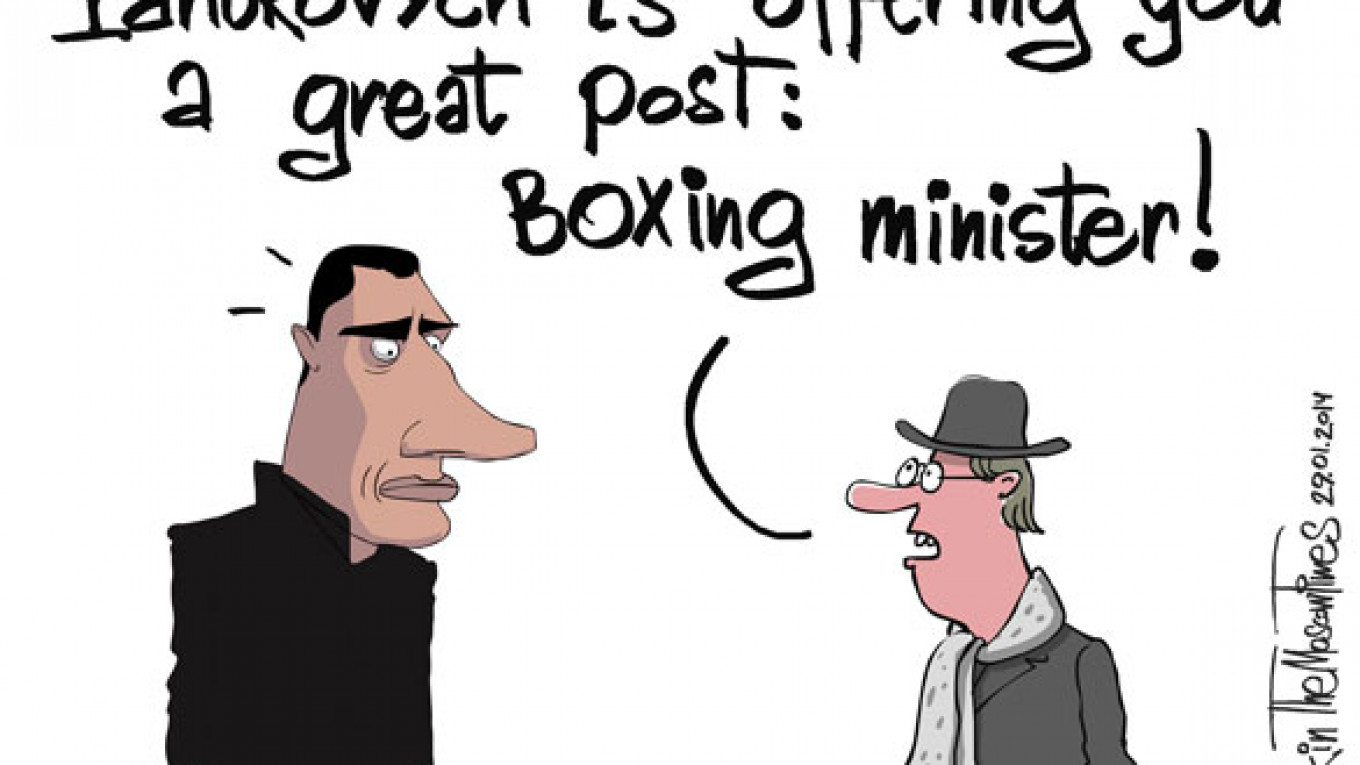Underneath the complex and rapidly changing situation in Ukraine lies a confrontation between pro-government supporters and protesters.
The first group supports the "legitimate authority" of President Viktor Yanukovych and condemns the extremists among the protesters who are trying to seize power. The second group emphasizes the illegal and unconstitutional actions taken by Yanukovych and his administration. Their main complaints concern violence perpetrated by the Berkut riot police and the draconian laws introduced on Jan. 16 that sharply limit individual rights and freedoms. The first group passionately advocates "stability," while the second just as fervently calls for freedom and the popular will.
The greatest threat to Ukraine is not the protests or Yanukovych. The primary threat is the growing chaos and complete disintegration of society.
Observers tend to focus on tactical questions. Will opposition leaders Arseny Yatsenyuk and Vitali Klitschko accept the senior government posts Yanukovych has offered them? If they do, will the Maidan protesters disperse and go home? Will Yanukovych agree to give the interior minister post to an opposition figure? Will Yanukovych agree to hold early presidential and parliamentary elections? Will he accept the opposition's demands for constitutional reform and a transition to a system balancing presidential and parliamentary powers? Will Yanukovych sign the Association Agreement with the European Union?
As important as those questions are, few people seem to notice the main issue: Ukraine is gradually deteriorating into another of the world's failed states. Worse, this trend is likely to continue regardless of who emerges victorious in the current power struggle — Yanukovych, Klitschko, Yatsenyuk or former Ukrainian Prime Minister Tymoshenko.
When the Soviet Union and Eastern bloc collapsed 25 years ago, Ukraine and Poland had similar economies and per capita gross domestic products. Today, Poland's GDP of $483 billion is almost triple that of Ukraine's $174 billion. Per capita GDP in Poland is $20,600 based on purchasing power parity, while Ukraine's is just $7,300. And those are figures from 2012. The situation in Ukraine has only worsened since then.
What's more, Ukraine has a huge and rapidly growing foreign debt, placing the country under constant threat of default. Its foreign exchange reserves are nearly depleted. Ukraine has a large negative trade balance and is desperately short on outside investment and private savings. Russia is the only country willing to extend financial assistance in exchange for Ukraine's nearly worthless junk bonds. President Vladimir Putin recently committed to buying $15 billion worth of these bonds, as well as extending significant discounts on Russian gas. No other country has made a serious offer to help.
Over the past 20 years, Ukraine has been unable to build effective government institutions and is ranked among the lowest in the world on a wide range of important indices.
According to the World Economic Forum competitiveness ranking for 2013 to 2014, Ukraine is in 84th place out of 148 states. Other countries ranked alongside Ukraine include Tunisia, Guatemala, Uruguay and Moldova.
According to Transparency International, Ukraine ranks in 144th place out of 175 for perceptions of corruption. Ukraine is also ranked among the very lowest for its judicial system, protection of property and administrative procedures.
In the 2014 Doing Business ranking by the World Bank, Ukraine stands in 112th place out of 189, even while Russia managed to climb from 120th place two years ago to 92nd place today.
Ukraine is deeply divided along both cultural and political lines, and this split seems to have only deepened over the past two decades. Demonstrators have seized local government buildings in 10 of Ukraine's western regions and proclaimed independent "people's councils" in their place. Meanwhile, the people in eastern Ukraine maintain their deeply rooted antipathy and distrust of western Ukraine, with their strong nationalistic and anti-Moscow sentiments.
Ukraine needs to do more than just reach a tactical compromise between the opposing sides and settle on who will serve in which government post. More important, they must find solutions to the country's systemic problems such as the need for a common identity, modern government institutions, rule of law and a strong economy. They must address the problem of extreme social stratification, for which Ukraine is currently ranked 120th in the world, a precipitous fall from 29th place in 1999. The country must also reduce its horrendous concentration of political power and wealth among a handful of oligarchs and stem the rampant corruption by starting with the family members of top officials.
The greatest threat to Ukraine is not the protests or Yanukovych. The primary threat is the growing chaos and complete disintegration of society.
The task before both Russia and the EU is not to gamble on this or that side in the European conflict but to help Ukraine — an important European country with a long history and rich culture — to stand firmly on its feet.
Vladimir Ryzhkov, a State Duma deputy from 1993 to 2007, is a co-founder of the opposition RPR-Party of People's Freedom.
A Message from The Moscow Times:
Dear readers,
We are facing unprecedented challenges. Russia's Prosecutor General's Office has designated The Moscow Times as an "undesirable" organization, criminalizing our work and putting our staff at risk of prosecution. This follows our earlier unjust labeling as a "foreign agent."
These actions are direct attempts to silence independent journalism in Russia. The authorities claim our work "discredits the decisions of the Russian leadership." We see things differently: we strive to provide accurate, unbiased reporting on Russia.
We, the journalists of The Moscow Times, refuse to be silenced. But to continue our work, we need your help.
Your support, no matter how small, makes a world of difference. If you can, please support us monthly starting from just $2. It's quick to set up, and every contribution makes a significant impact.
By supporting The Moscow Times, you're defending open, independent journalism in the face of repression. Thank you for standing with us.
Remind me later.








